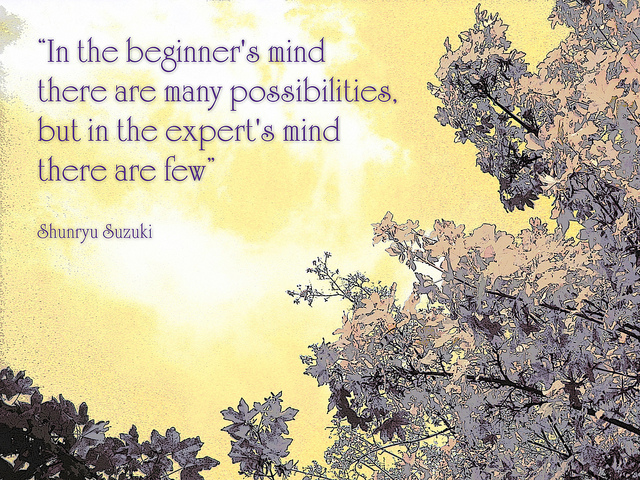No matter how advanced we become, remaining a humble beginner in heart and mind is the key to all real success.
We’re all beginners at heart.
What happens when we fall out of beginners mind? We run the risk of “knowing it all.”
And we all know the implications of that! Regardless of our worldly accomplishments, look deeper and become friends with the voice that says, “I don’t know.” We avoid this inner voice because it’s uncomfortable—and yet it is only by grappling with it that we get through its seeming limitation to real wisdom.
We shut out “beginners mind” to keep up with the world—to make ourselves appear better than we think we really are. We shun beginners mind because we would rather be “right” than truly effective and happy.
Plato tells the story of a young man who went to Socrates and said to him, “The people believe you are the wisest man in all the land.” To which Socrates replied, “If that is true, then it is because I know that I don’t know.”
This statement is not only full of tender humility, it is full of infinite wisdom. It’s a koan of sorts.
He did not simply say, “Awe gee thanks, but I don’t really know anything.”
There is another underlying message: He knows that he does not know.
Do you? (Hidden in the quote Socrates is also saying, “I know true-self. I know who I am.” Socrates called this awareness of mind Goodness—the Source from which all true happiness and wisdom comes. He knew it as a state of mind, available and common to all.)
Socrates had beginners mind. The “I” that does not know is the ego.
It too is common to all. We all have one.
The ego is the false-self that endeavors to figure out who it is and what its role is here in this lifetime. It’s the self that constantly seeks, but never truly finds. It’s the self that refuses to admit it is wrong. It is the self that judges and condemns while pursuing self-serving needs and wants.
Ironically, the “I” that does not know is often defensive to the point of self sabotage. This list of tragic errors could go on forever, but the takeaway is the fact that false self known as the ego, does not know—anything! The ego may think it knows, and it often gets a lot of stuff “right,” but it is never deeply fulfilled and happy.
There’s more to success than worldly progress, which is why many unconsciously fear success (but that’s another story). The goal is not to just get better in the dream, the goal is also to awaken from it!
Beginners mind is the practice of recognizing and respecting the part of our mind that does not know.
It is a requirement for eventually gleaning the wisdom of true-self.
Arrogance and real wisdom cannot coexist in our mind.
Beginners mind is well aware of the ego’s need to be known, promoted and defended. Beginners mind knows that the ego is impatient and inherently destructive to real success. Beginners mind then, looks, waits and withholds judgment.
With no degree of fickleness, beginners mind delays important decisions (as long as possible) and waits for the voice of true-self to come through.
Beginners mind knows that it does not know.
It waits for the inner-voice of true-self that always has your highest interest in mind. Beginners mind never makes a decision alone. When possible, beginners mind seeks counsel from anyone willing to help, knowing that the correct decision excludes no one and no thing in heart and mind. Therefore, without discrediting self, beginners mind makes decisions with the other in mind.
Beginners mind will take us home to the seat of ever-present peace and joy.
To truly succeed, become an expert—yet remain a humble beginner in our heart and mind.
Relephant read:
10 Ways to Maintain a Beginner’s Mind.
Author: Jeff Bailey
Editor: Ashleigh Hitchcock
Photos: flickr

 Share on bsky
Share on bsky





Read 0 comments and reply